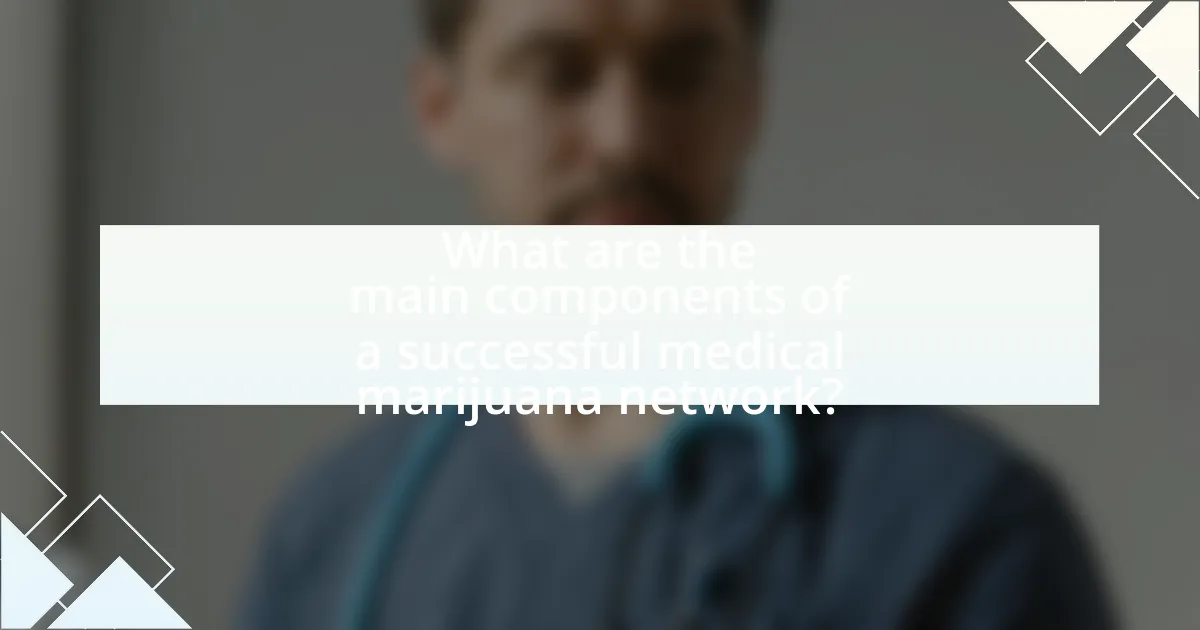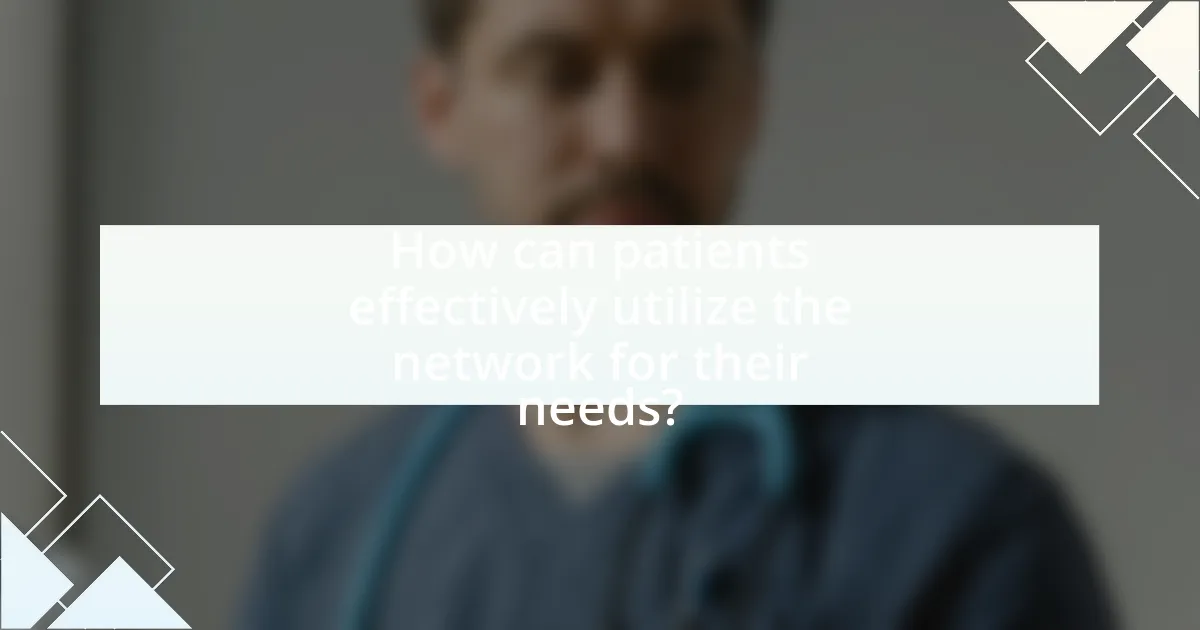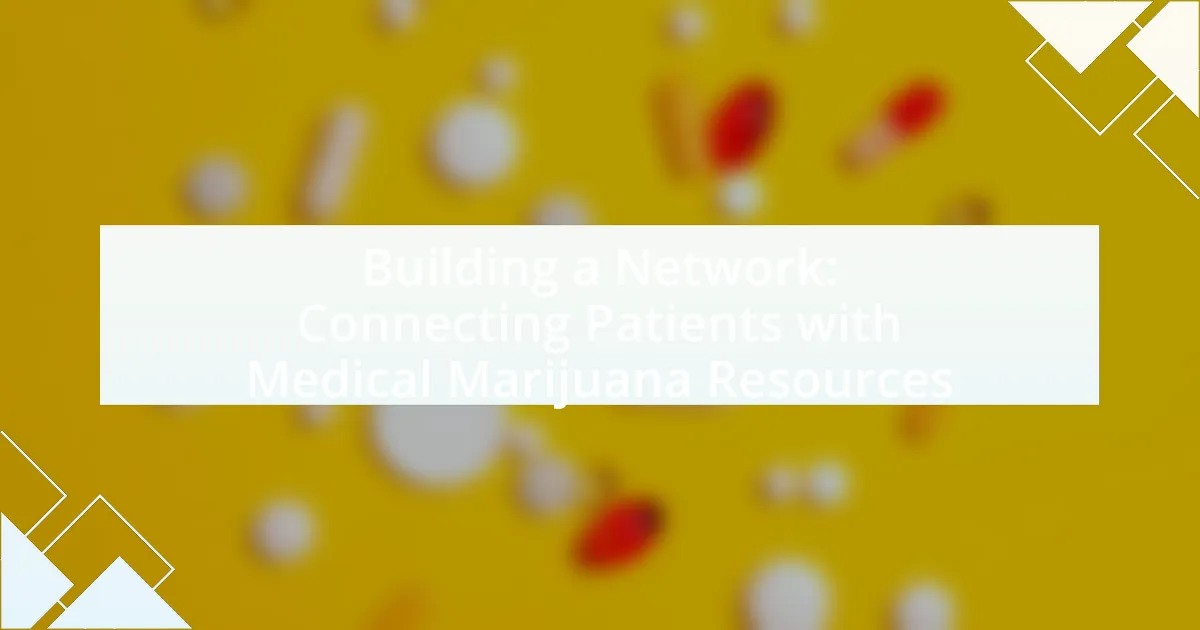Building a network for medical marijuana resources is essential for connecting patients, healthcare providers, and dispensaries to enhance access to medical marijuana. This network facilitates patient education, streamlines the acquisition process, and ensures proper guidance and support, ultimately improving patient outcomes. Key components include access to licensed dispensaries, healthcare professionals, educational materials, and support groups, all of which contribute to informed decision-making and better management of medical conditions. The article explores the functionality of this network, the challenges faced by patients without it, and the roles of various stakeholders, including healthcare providers and dispensaries, in fostering effective connections within the medical marijuana community.

What is Building a Network for Medical Marijuana Resources?
Building a network for medical marijuana resources involves creating a structured system that connects patients, healthcare providers, and dispensaries to facilitate access to medical marijuana. This network aims to improve patient education, streamline the process of obtaining medical marijuana, and ensure that patients receive appropriate guidance and support. Research indicates that effective networks can enhance patient outcomes by providing reliable information and resources, as evidenced by studies showing increased patient satisfaction and better management of medical conditions through access to cannabis-based treatments.
How does this network function to connect patients with resources?
This network connects patients with resources by facilitating access to medical marijuana through a structured platform that links patients to licensed dispensaries, healthcare providers, and educational materials. The network operates by providing a centralized database where patients can find verified dispensaries that offer medical marijuana products, ensuring compliance with local regulations. Additionally, the network offers resources such as consultations with healthcare professionals who specialize in medical marijuana, helping patients understand their options and make informed decisions. This approach is supported by data indicating that patients who utilize such networks report higher satisfaction and better health outcomes, as they receive tailored support and guidance in navigating their medical marijuana needs.
What types of resources are included in this network?
The network includes various resources such as licensed medical marijuana dispensaries, healthcare professionals knowledgeable about medical cannabis, educational materials on the use and benefits of medical marijuana, and support groups for patients. These resources are essential for patients seeking guidance and access to medical marijuana, ensuring they receive accurate information and appropriate care. The presence of licensed dispensaries guarantees that patients can obtain safe and regulated products, while healthcare professionals provide necessary medical advice tailored to individual needs.
How do patients access these resources through the network?
Patients access medical marijuana resources through the network by utilizing online platforms and local dispensaries that provide information and services. These platforms often include websites and mobile applications that offer educational materials, product availability, and physician referrals. Additionally, local dispensaries serve as physical points of access where patients can consult with knowledgeable staff, obtain prescriptions, and purchase products. The integration of telemedicine services further enhances access, allowing patients to connect with healthcare providers remotely for consultations and recommendations.
Why is building a network important for patients seeking medical marijuana?
Building a network is crucial for patients seeking medical marijuana because it provides access to vital information, resources, and support. A well-established network can connect patients with healthcare professionals who understand medical marijuana, facilitating informed decisions about treatment options. Additionally, networking with other patients allows individuals to share experiences, recommendations, and insights about effective strains and dosages, which can enhance their overall treatment experience. Research indicates that patients who engage with support networks report higher satisfaction and better health outcomes, underscoring the importance of community in navigating the complexities of medical marijuana use.
What challenges do patients face without a network?
Patients face significant challenges without a network, including limited access to information, resources, and support. Without a network, patients may struggle to find reliable sources of medical marijuana, leading to misinformation and potential misuse. Additionally, the absence of a support system can result in feelings of isolation, making it difficult for patients to share experiences or seek advice from others who understand their conditions. Research indicates that social support networks are crucial for chronic illness management, as they provide emotional and practical assistance, which is often lacking for those without connections in the medical marijuana community.
How can a network improve patient outcomes in medical marijuana use?
A network can improve patient outcomes in medical marijuana use by facilitating access to information, resources, and support systems tailored to individual patient needs. By connecting patients with healthcare professionals, educational materials, and peer support groups, networks can enhance understanding of medical marijuana’s benefits and risks, leading to more informed decision-making. Research indicates that patients who engage with supportive networks report higher satisfaction and better management of symptoms, as evidenced by a study published in the Journal of Pain Research, which found that 70% of participants experienced improved quality of life when utilizing community resources related to medical marijuana.
Who are the key stakeholders in building this network?
The key stakeholders in building a network to connect patients with medical marijuana resources include healthcare providers, patients, regulatory bodies, and cannabis industry representatives. Healthcare providers play a crucial role in educating patients about medical marijuana and prescribing it when appropriate. Patients are essential as they are the end-users of the resources and services offered. Regulatory bodies ensure compliance with laws and regulations governing medical marijuana, which is vital for the network’s legitimacy. Cannabis industry representatives contribute by providing products and services that meet patient needs, thus facilitating access to medical marijuana. Each stakeholder’s involvement is critical for creating a comprehensive and effective network that supports patient access to medical marijuana resources.
What roles do healthcare providers play in the network?
Healthcare providers play a crucial role in the network by facilitating access to medical marijuana resources for patients. They assess patients’ medical conditions, determine eligibility for medical marijuana use, and provide recommendations based on clinical guidelines. Additionally, healthcare providers educate patients about the benefits and risks associated with medical marijuana, ensuring informed decision-making. Research indicates that effective communication between healthcare providers and patients enhances treatment outcomes, as evidenced by a study published in the Journal of Cannabis Research, which highlights the importance of provider involvement in patient education and support.
How do dispensaries contribute to the network’s effectiveness?
Dispensaries enhance the network’s effectiveness by providing direct access to medical marijuana for patients, ensuring they receive the appropriate products for their health needs. This accessibility facilitates timely treatment and fosters patient adherence to prescribed therapies. Furthermore, dispensaries often employ knowledgeable staff who can offer guidance and education on product selection, thereby improving patient outcomes. Research indicates that states with well-regulated dispensaries report higher patient satisfaction and better health results, demonstrating the critical role dispensaries play in the overall effectiveness of medical marijuana networks.

What are the main components of a successful medical marijuana network?
The main components of a successful medical marijuana network include patient education, access to quality products, regulatory compliance, and a support system for patients. Patient education ensures that individuals understand the benefits and risks of medical marijuana, which is crucial for informed decision-making. Access to quality products involves establishing reliable sources for high-quality cannabis that meets safety standards, as evidenced by the increasing demand for lab-tested products. Regulatory compliance is essential to navigate the legal landscape, ensuring that all operations adhere to local and state laws, which is vital for maintaining legitimacy and trust. Lastly, a support system, including healthcare professionals and community resources, provides ongoing assistance and guidance to patients, enhancing their overall experience and outcomes in using medical marijuana.
How can technology enhance the connection between patients and resources?
Technology enhances the connection between patients and resources by providing accessible platforms for information, communication, and support. Digital tools such as telemedicine, mobile applications, and online forums facilitate real-time interactions between patients and healthcare providers, enabling patients to access medical marijuana resources more efficiently. For instance, a study published in the Journal of Medical Internet Research found that telehealth services increased patient engagement and satisfaction by 30%, demonstrating the effectiveness of technology in bridging gaps in healthcare access. Additionally, online databases and educational websites offer comprehensive information about medical marijuana, including dosage, strains, and legal regulations, empowering patients to make informed decisions about their treatment options.
What platforms are most effective for building this network?
Social media platforms, particularly Facebook and Instagram, are most effective for building a network that connects patients with medical marijuana resources. These platforms allow for targeted advertising, community building, and sharing of information, which are crucial for reaching and engaging with patients seeking medical marijuana. For instance, Facebook groups can facilitate discussions and support among patients, while Instagram can visually showcase products and educational content. According to a 2021 study published in the Journal of Medical Internet Research, 70% of patients reported using social media to find health-related information, highlighting its effectiveness in connecting individuals with medical resources.
How does data sharing improve patient access to resources?
Data sharing improves patient access to resources by facilitating the exchange of critical information among healthcare providers, patients, and support networks. This enhanced communication allows patients to receive timely updates on available medical marijuana resources, treatment options, and local dispensaries. For instance, a study published in the Journal of Medical Internet Research found that integrated health information systems increased patient engagement and access to care by 30%, demonstrating the effectiveness of data sharing in improving resource accessibility.
What educational resources are essential for patients?
Essential educational resources for patients include comprehensive guides on medical marijuana, access to certified healthcare professionals, and reputable online platforms that provide evidence-based information. Comprehensive guides, such as those published by organizations like the American Medical Association, outline the benefits, risks, and legal considerations of medical marijuana use. Access to certified healthcare professionals ensures that patients receive personalized advice tailored to their specific medical conditions and treatment plans. Reputable online platforms, such as the National Institute on Drug Abuse, offer research-backed information that helps patients make informed decisions regarding their treatment options. These resources collectively empower patients with the knowledge necessary to navigate the complexities of medical marijuana use effectively.
How can workshops and seminars benefit patients?
Workshops and seminars can benefit patients by providing them with essential knowledge and resources related to medical marijuana. These educational events facilitate direct access to expert information, enabling patients to understand the therapeutic uses, potential side effects, and legal considerations of medical marijuana. Research indicates that informed patients are more likely to make better health decisions; for instance, a study published in the Journal of Pain and Symptom Management found that educational interventions significantly improved patients’ understanding of cannabis use for pain management. Additionally, workshops often create a supportive community, allowing patients to share experiences and connect with others facing similar health challenges, which can enhance emotional well-being and reduce feelings of isolation.
What online resources should be included in the network?
The online resources that should be included in the network for connecting patients with medical marijuana resources are educational websites, telehealth platforms, patient forums, and dispensary locators. Educational websites, such as Leafly and Project CBD, provide comprehensive information on strains, benefits, and usage. Telehealth platforms like HelloMD facilitate virtual consultations with healthcare professionals knowledgeable about medical marijuana. Patient forums, such as Reddit’s r/medicalmarijuana, offer community support and shared experiences. Dispensary locators, like Weedmaps, help patients find licensed dispensaries in their area. These resources collectively enhance patient access to information and services related to medical marijuana.
What legal considerations must be addressed in building this network?
Building a network that connects patients with medical marijuana resources requires addressing several legal considerations, primarily compliance with state and federal laws regarding medical marijuana. Each state has its own regulations governing the use, distribution, and cultivation of medical marijuana, which must be thoroughly understood and adhered to in order to avoid legal repercussions.
Additionally, privacy laws such as the Health Insurance Portability and Accountability Act (HIPAA) must be considered to ensure that patient information is protected during the network’s operation. Failure to comply with these regulations can result in significant legal penalties, including fines and potential criminal charges.
Furthermore, the network must also consider zoning laws that may affect the location of dispensaries or cultivation sites, as well as any licensing requirements that may be necessary to operate legally within a given jurisdiction. These legal frameworks are essential to ensure the network operates within the law and protects both the patients and the providers involved.
How do state regulations impact the network’s structure?
State regulations significantly shape the network’s structure by establishing the legal framework within which medical marijuana resources operate. These regulations dictate licensing requirements, operational protocols, and compliance standards for dispensaries and healthcare providers, thereby influencing how these entities interact within the network. For instance, states with stringent regulations may limit the number of licensed dispensaries, resulting in a more centralized network structure, while states with more lenient regulations may foster a decentralized network with numerous providers. Additionally, regulations can affect patient access by determining eligibility criteria and the types of medical conditions that qualify for treatment, which in turn impacts the overall connectivity and accessibility of resources within the network.
What compliance measures are necessary for stakeholders?
Compliance measures necessary for stakeholders in the context of connecting patients with medical marijuana resources include adherence to local and federal regulations, ensuring patient privacy, and maintaining accurate record-keeping. Stakeholders must comply with laws such as the Controlled Substances Act, which governs the legal use of marijuana, and state-specific medical marijuana regulations that outline licensing and operational standards. Additionally, stakeholders are required to implement measures that protect patient information in accordance with the Health Insurance Portability and Accountability Act (HIPAA). Accurate record-keeping is essential for tracking patient interactions and ensuring compliance with regulatory audits. These measures are critical to mitigate legal risks and promote safe access to medical marijuana for patients.

How can patients effectively utilize the network for their needs?
Patients can effectively utilize the network for their needs by actively engaging with online platforms that connect them to medical marijuana resources, such as forums, support groups, and educational websites. These platforms provide access to valuable information regarding strains, dosages, and legal regulations, enabling patients to make informed decisions about their treatment. For instance, studies show that patients who participate in online communities report higher satisfaction with their treatment outcomes, as they can share experiences and receive peer support. By leveraging these networks, patients can enhance their understanding of medical marijuana and find tailored solutions to their specific health conditions.
What steps should patients take to engage with the network?
Patients should take the following steps to engage with the network: first, they should identify and join local or online support groups focused on medical marijuana. These groups often provide valuable resources, information, and community support. Next, patients should participate in educational workshops or seminars offered by the network, which can enhance their understanding of medical marijuana and its benefits. Additionally, patients should actively communicate with healthcare providers who are knowledgeable about medical marijuana, as this can facilitate personalized treatment plans. Finally, patients should share their experiences and insights within the network, contributing to a collective knowledge base that can benefit others. Engaging in these activities fosters a supportive environment and enhances access to medical marijuana resources.
How can patients identify trustworthy resources within the network?
Patients can identify trustworthy resources within the network by evaluating the credibility of the source, checking for peer-reviewed information, and seeking recommendations from healthcare professionals. Credible sources often include established medical organizations, government health websites, and academic institutions that provide evidence-based information. For instance, the National Institutes of Health and the American Medical Association are recognized for their reliable health resources. Additionally, patients should look for resources that cite scientific studies or clinical trials, as these provide a foundation of evidence supporting the information presented.
What questions should patients ask when seeking information?
Patients seeking information about medical marijuana should ask the following questions: What are the potential benefits and risks of using medical marijuana for my condition? How do different strains or forms of medical marijuana affect symptoms? What dosage is recommended for my specific needs? Are there any legal considerations or restrictions I should be aware of in my state? How can I find a qualified healthcare provider who understands medical marijuana? What resources are available for patient education and support? These questions are essential for informed decision-making and ensuring safe and effective use of medical marijuana.
What best practices should patients follow when using medical marijuana?
Patients using medical marijuana should consult with a healthcare professional to determine the appropriate strain, dosage, and method of consumption for their specific medical condition. This practice ensures that patients receive tailored advice based on their health needs and potential interactions with other medications. Research indicates that personalized treatment plans can enhance the effectiveness of medical marijuana, as different strains contain varying levels of cannabinoids and terpenes that may affect individuals differently. Additionally, patients should keep a journal to track their symptoms and responses to different dosages and strains, which can help in refining their treatment plan over time.
How can patients monitor their health outcomes while using medical marijuana?
Patients can monitor their health outcomes while using medical marijuana by keeping a detailed journal of their symptoms, dosage, and any side effects experienced. This method allows patients to track changes in their condition over time and assess the effectiveness of the treatment. Research indicates that self-monitoring can lead to better health management, as evidenced by a study published in the Journal of Pain Research, which found that patients who actively recorded their experiences reported improved symptom control and satisfaction with their treatment. Additionally, utilizing mobile health apps designed for tracking medication use and health metrics can enhance this monitoring process, providing patients with visual data and trends related to their health outcomes.
What tips can help patients navigate the network effectively?
Patients can navigate the network effectively by utilizing online resources, joining support groups, and consulting healthcare professionals. Online platforms provide access to information about medical marijuana laws, dispensaries, and patient experiences, which can guide patients in making informed decisions. Support groups, whether in-person or virtual, offer community insights and shared experiences that can enhance understanding of available resources. Consulting healthcare professionals ensures that patients receive tailored advice based on their specific medical needs and legal considerations. These strategies collectively empower patients to make informed choices within the medical marijuana network.

Leave a Reply